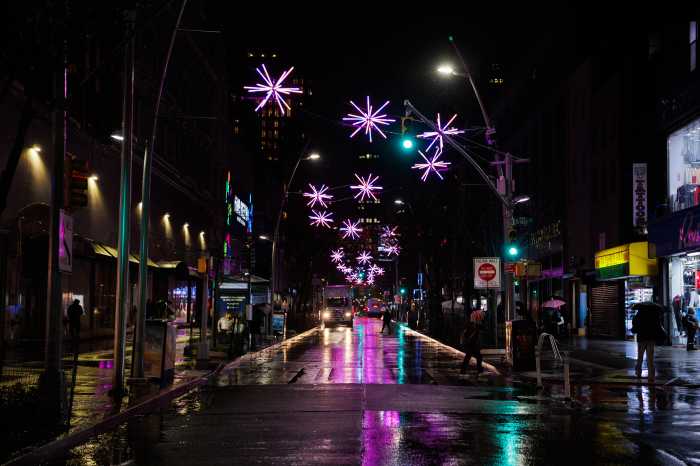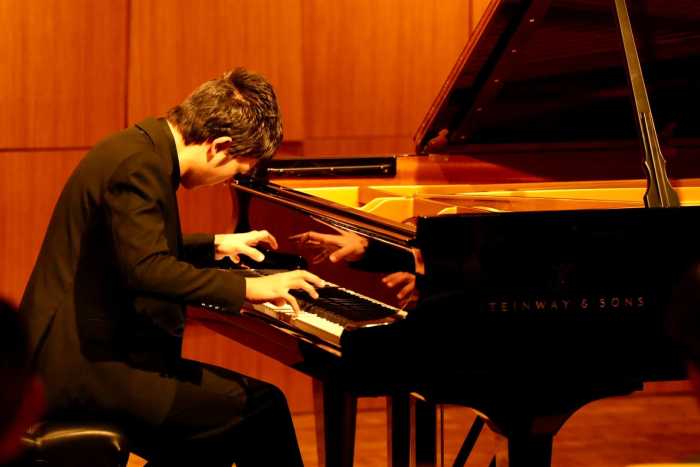Leaders at several non-profit groups serving LGBTQ New Yorkers huddled together for a Gay City News virtual conference on June 30 to discuss how the coronavirus pandemic has impacted their organizations.
Gay City News’ Zoom event, called “Rising to the Challenge: Non-Profits in the Age of COVID,” touched on some of the most critical areas affecting the organizations in the coronavirus era, including funding, operations, and demand for services, as well as how the groups have been able to improvise and adjust to the new realities brought on by the sudden crisis.
The event’s participants were Alex Roque, president and executive director of the Ali Forney Center; Carmen Neely, co-founder and president of Harlem Pride; Floyd Rumohr, CEO of Brooklyn Community Pride Center; Sean Coleman, founder and executive director of Destination Tomorrow; Emmett Findley, communications director of God’s Love We Deliver; and Ineke Mushovic, executive director of Movement Advancement Project. Paul Schindler, founding editor-in-chief of Gay City News, moderated the discussion.
Wide-ranging virtual conference sheds light on pandemic’s impact on LGBTQ community
While the leaders elaborated on many of the most acute challenges facing their groups and clientele, there were also some unique developments that came with the sudden shift to virtual programs. Rumohr said the Brooklyn Community Pride Center saw hundreds more people than usual attend virtual offerings — including folks from outside of the borough — and some other non-profits, like Destination Tomorrow in the Bronx, similarly saw upticks in attendance. Those organizations attributed the increase in part to the relative ease of attending events online, and Rumohr’s team capitalized on the virtual aspect even further by offering online internships.
Coleman and Rumohr also said their respective groups were well-equipped to make the changes to virtual-focused services.
“Within days, we were up and running with everything from AA groups to transgender and gender non-conforming support groups,” Rumohr explained.
Coleman added, “We had the infrastructure in place so we could take many of our programs and services virtual. But myself and both of my directors came down with COVID-19-like symptoms, so it complicated the process as we were trying to pivot into this digital world… We did it — it took a lot but we were able to accomplish it.”
At the same time, several organizations encountered issues such as access to technology for members who did not have the necessary equipment or Internet access in their homes. Coleman said 20 percent of people in a particular class facilitated by Destination Tomorrow were unable to attend the sessions because they lacked accessibility. That dilemma prompted Destination Tomorrow to launch a fundraiser dedicated to raising money to support those without digital access.
At the Ali Forney Center, which serves homeless queer youth, Roque said his team has seen a 60 percent increase in online engagement in mental health services, a 25 percent increase in substance services, and a 35 percent increase in crisis care. But his team simultaneously had to make adjustments on the fly while juggling the responsibilities that come with housing as many as 157 queer youth on any given night. The facilities across the city where those youth are housed obviously had to remain open as everyone in New York struggled to find safe ways to socially distance during a pandemic.
“For our young people, that option of home — that comfort of home, that safety of home — does not exist and in all cases it’s a retraumatizing of their experiences,” Roque said. “It’s a reminder of how much they have lost and how much they have been denied because of their identity.”
While the Ali Forney Center typically sees many clients coming from outside of the New York City metro area, reductions in travel and the shuttering of college campuses meant that many incoming clients during the pandemic have been youth who previously resided at their shelters or transitional housing and were forced to return when their dorms were closed.
Roque reported that his organization has seen an “incredible outpouring of support” despite taking financial hits in the process, but he anticipates that the organization will absorb bigger losses — especially drops in private funding — because numerous events have had to be cancelled due to the pandemic.
“We’re a $15.5 million organization and we’re looking at roughly a $1.5 to $2 million loss… largely half of our private [money], which is $5.5 million,” Roque said.
Funding has become a dilemma in different ways for Neely and the team at Harlem Pride, which celebrated its 10-year anniversary last year.
“What really impacted us is we had various events going on at different restaurants and bars in the neighborhood and that had to shut down,” Neely explained, adding that there was also a significant drop in sponsorship funding. “Our main event, Harlem Pride celebration day, garnered 20,000 people last year — we had to cancel that… We are at a bit of a deficit in terms of planning for next year.”
Despite the hit in sponsorship revenue, Neely said Harlem Pride has been bolstered during the pandemic by individual donors and private foundations, leaving the team in solid position to pay bills. Private foundations have even chipped in more money than usual during the crisis.
“Quite a few of our solid sponsors who have been with us from the beginning and throughout the majority of our 11 years came through with various options and packages that we were able to work with,” Neely explained.
Because Harlem Pride couldn’t go on as planned, the team created a digital hub and adjusted its “ShowOUT” performance event by facilitating performances featuring an “American Idol”-like competition. Website traffic, Neely said, also increased during the COVID era, “but not to the degree we hoped it would.” Many folks have traditionally connected to Harlem Pride through its Facebook page, she explained, so awareness of its website’s offerings needed to be promoted.
“With social media, we were pretty much happy with what we got,” Neely said. “We have what we typically have and a little bit more.”
Like everyone else, the team at Harlem Pride is cognizant of the realities of the pandemic: Long-term planning remains a challenge for the foreseeable future due to the volatile nature of the virus.
“I doubt next year will allow us to have typical celebrations, but we just don’t know what to expect and it’s hard to predict,” Neely added.
God’s Love We Deliver, which delivers more than two million weekday meals per year to New York area residents too sick to consistently shop or cook on their own, was deemed an essential service provider and has continued serving folks throughout the pandemic. But the team has been forced to grapple with the daunting task of meeting demand while adhering to coronavirus guidelines.
“We originally lost volunteers and then we gained volunteers… but we had to decrease volunteers on shifts just so we could socially distance,” Findley recalled, noting that there was a 60 percent reduction in God’s Love’s volunteer force compared to a 25 percent increase in clients and meals. “We’ve had fewer folks in the kitchen but we still gotta deliver 10,000 meals per day.”
At Movement Advancement Project, an independent think tank dedicated to developing research and insight with the goal of bolstering equality and opportunity for the LGBTQ community, there is a broader focus on the ways groups have been impacted by the pandemic. Mushovic pointed to some lessons learned during the crisis, such as the way in which virtual programs can benefit individuals in remote, rural areas where such offerings have historically been nonexistent.
But she also cited issues that have emerged: She warned that community centers nationwide are facing serious financial jeopardy and also raised questions about how advocacy organizations are going to lobby lawmakers at a time when “you can’t go into a politician’s office and have face-to-face conversations.”
Mushovic also said community centers that rely on programmatic income are bracing for significant reductions in funding from government and other sources.
“We’re very concerned because our view is that we’re in for a tough winter,” Mushovic said.
The sponsors who made the event possible were MetroPlus Health, AARP New York City, Apicha Community Health Center, New York City Health + Hospitals/ Kings County, and the AIDS Healthcare Foundation.
The entirety of the wide-ranging discussion can be viewed on YouTube:
To sign up for the Gay City News email newsletter, visit gaycitynews.com/newsletter.

















